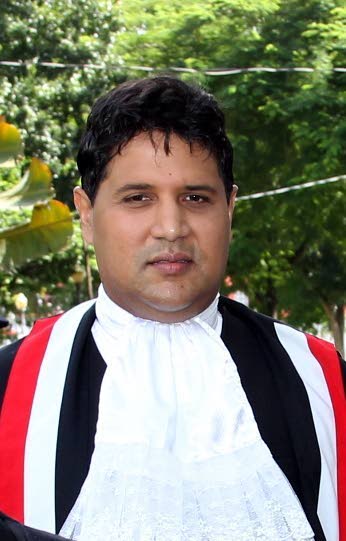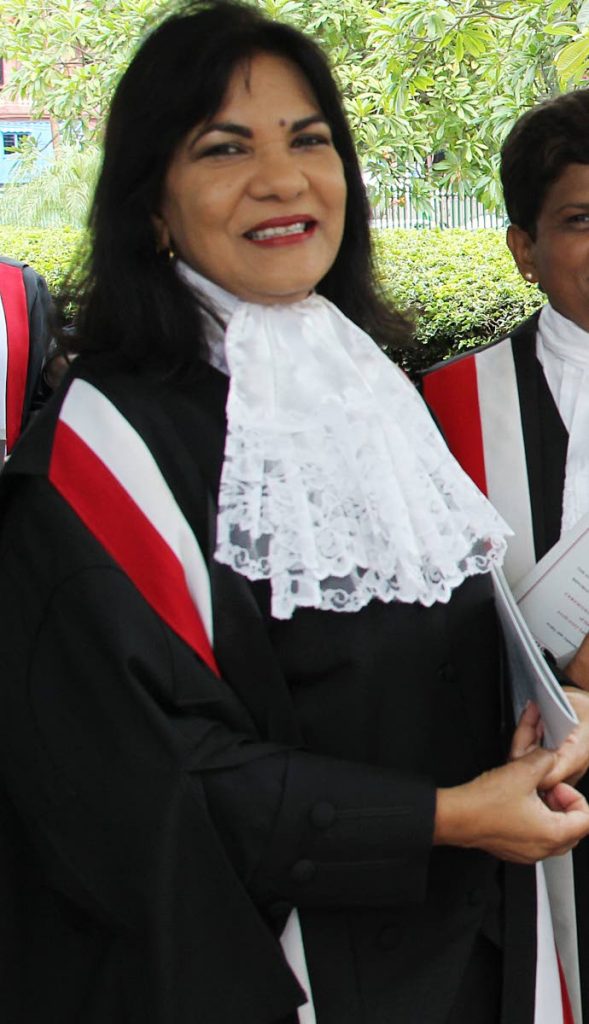JUDGES OBJECT TO BAN ON IN-PERSON HEARINGS

TWO High Court judges are resolutely against recent practice directions which have put a ban on in-person hearings in court.
In a letter to Chief Justice Ivor Archie, who issued the new practice directions on Wednesday, Justice Frank Seepersad last Friday said he took “serious issue with the practice direction’s interference” with his independence, case management decisions and removal of his discretion to determine if he should conduct a safe “in-person” trial at this time.
In agreement with this position was the equally outspoken judge, Justice Carol Gobin who called on the CJ to reconsider the policy in the absence of reasons to support the ban on in-person hearings without an end date. In an e-mail to the CJ, Gobin said the mandate by the head of the Judiciary to adjourn her trials, listed for the next few months, was “objectionable.”
EMPTY HALL
OF JUSTICE
She said she took a stroll through the Hall of Justice and the 20 or so courtrooms were large enough to safely accommodate trials with the requisite protocols of physical distancing.
“It was eerie. Most were locked, all empty and abandoned for a reason which remains a mystery…This when the judiciary has from the inception been deemed an essential service and when as the Honourable Prime Minister continues to remind, we are not on lockdown,” Gobin said.
“Surely the judges and all judicial officers who work in the system and the taxpayers who have paid for the court buildings and who even in these difficult times are paying for an expanding system of courts and court personnel, deserve better than this.
“The practice direction has effectively removed the ability of judges to perform one of their core functions, the trial of disputes, in an environment in which the public can have confidence.
"Remote hearings for CMCs (case management conferences) and some applications (even with the technical difficulties that are invariably experienced) are, no doubt, generally sufficient to meet the requirements of fairness and efficiency, but I do not consider them to be appropriate for trials and generally, my feedback from attorneys and litigants is that they share this view,” she added.
For his part, Seepersad said he had five trials that cannot be heard by virtual hearing and he intends to hold those trials in-person, even if it means using another suitable location, such as the conference facilities at the Law Association building, or the conference rooms of attorneys.
“While I assume full responsibility for my safety,” he said. He said his staff can work from home to ensure the proceedings are properly recorded.
VIRTUAL TRIALS ARE "TAXING"
“Such a situation, can, of course, be circumvented, if the decision to prohibit “in-person” hearings at court buildings, is reviewed. Chief Justice, this pandemic will be with us for a while and we must find a way to ensure that trials are done so that our citizens are afforded the justice that they pay for, expect and demand,” Seepersad told the Chief Justice.
The judge said despite the restrictions on courts caused by the covid19 pandemic, he was able to complete 11 trials from June to present but complained that, on average, he usually did that many trials in a month.
“Accordingly, my turnover has now been reduced to one-third of my usual output, thankfully quite a few matters which were listed for trial were settled.
“Having liaised with other civil judges, I have realised that very few remote trials have been engaged. The virtual trials are taxing, hard on the eyes, the integrity of the evidence is questionable and they take longer to complete. It is also evident that with the exception of a handful of judge-alone trials, the criminal justice system has come to a grinding halt as jury trials have been effectively stopped since March,” he complained.
In calling for a meeting with all judges, Seepersad added, “Chief Justice, this situation is untenable and though the statistics may demonstrate that hundreds possibly thousands of virtual hearings have occurred, it would be disingenuous to assert that the system is working.
“The disposition rate over the period of March to present must be well below average and would possibly believe any such contention. The citizens of this Republic surely deserve better,” he wrote.

On his suggestion to hold in-person trials outside of court, Seepersad said the practice directions did not impose a restriction on where a court should sit, and the ban on in-person hearings only relates to the ability to access court buildings.
“I am of the view that there is no prohibition against my conducting an “in-person” trial at any other suitable location with the consent of the lawyers and litigants,” he said, adding that he has written to the Law Association and the Assembly of Southern Lawyers on the issue.
Gobin said prior to the ban on in-person hearings, court users were taking the necessary precautions “and we were all working together and getting the job done.”
NO REASONS
"We have not been told why the Chief Justice considered if he did, that those measures did not meet standards set by the ministry or health officials,” she said, adding that all her suggestion, which included those implemented at various workplaces and which have been accepted by health officials were ignored.
“Instead, every single court building throughout TT has been locked to the public, save for access in some domestic violence matters. This is to me, unfathomable, especially given the undeniably wretched state of the delivery of justice in the magistrates' courts, which, I can say has existed since well before I entered the legal profession four decades ago. I hasten to make clear that I accept that one could not expect business as usual,” she added.
“I worry about the effect of this draconian shutdown measure on the backlog especially in lower courts, on prisoners on remand and accused persons on bail who from my understanding have for the most part been logging on for adjourned dates.
“But I am sure that the Chief Justice will be accounting to the public in due course. He will no doubt be indicating how many criminal and civil trials at both levels have actually been heard since March 16,” she said.
“I respectfully suggest too, that this is a good time for the Chief Justice to consider whether the removal of the court vacation simultaneously with the closure of every single court building has resulted in any benefit to the public or whether it has effectively reduced the work of some judicial officers, increased the amount of their vacation entitlement, while at the same time it has impeded the delivery of justice to citizens who have been long-suffering in the system,” Gobin said.
The court’s six-week-long vacation, which would have started on September 16, was abolished for the 2020/2021 and 2020/2021 terms, because of the coronavirus pandemic.
In a previous response to questions from Newsday, the Judiciary said the proposal was aimed at providing “greater flexibility to judges and lawyers to arrange their schedules and lives and to ensure that the public has enhanced access to justice.
“With the heavy caseloads and with the backlog, it is totally inappropriate and insensitive, and in fact somewhat irresponsible, to shut ourselves off from the public for six weeks of the year while the people’s business goes wanting.”
IS THIS APPROPRIATE?
Gobin also questioned the “appropriateness” of the ban on in-person hearing especially when the CJ is, this week, expected to be questioned in former chief magistrate Marcia Ayers-Caesar’s trial against the Judicial and Legal Service Commission which he leads.
“The Honourable Chief Justice, a litigant and a witness, has mere days before his appearance in court (unintentionally I am sure ) set the rules to suit to limit in-person access to the proceedings. The appropriateness of this in any circumstances should be a matter of concern to all, and not just to persons directly involved in the litigation,” she said.
Like Seepersad, Gobin called on the CJ to allow her access to a trial courtroom and urged those in court administration who have been attempting to interfere with my use, even of video conferencing rooms to conduct remote hearings from the Hall of Justice, to desist.”According to the practice directions issued last week, there will be no in-person hearings, and for cases where it is impossible to conduct a matter by electronic means, or not in the interest of justice, the court can adjourn it and give directions.
All jury trials are also suspended and prisoners will not be required to go to a court building. Bail for those who are already out on bail will be extended to the next court date on the same conditions imposed by the judge or magistrate.
In July, the Director of Public Prosecutions took a decision that no evidence will be taken at his office for criminal trials.
Instead, he maintained that the taking of evidence should return to the Hall of Justice. The last virtual jury trial was held in July when covid19 public health regulations were related to allowing for gatherings of up to 25 people. Since then, the regulations were revised allowing for the gathering of only five people.
On September 12, the prime minister said the current restrictions will stay in place until October 11.


Comments
"JUDGES OBJECT TO BAN ON IN-PERSON HEARINGS"